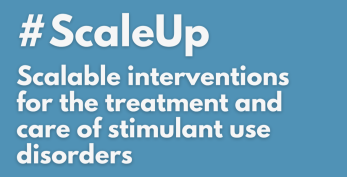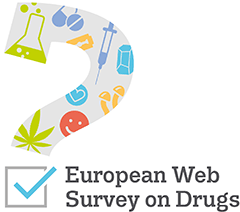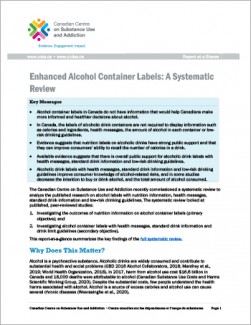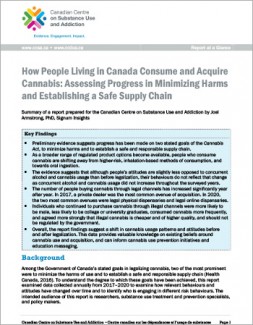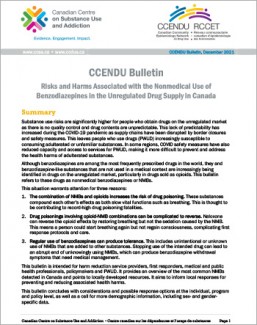
Ara

European Web Survey on Drugs 2021: Emerging findings in Lebanon
The European Web Survey on Drugs1 collected data during March and May 2021 from people who use drugs, are aged 18 or older, and live in 21 EU and 9 non-EU countries including Lebanon. In this period, the populations in many European and...
Interdisciplinary collaboration in the treatment of alcohol use disorders in a general hospital department: a mixed-method study
Background
In somatic health care settings, interdisciplinary collaborations (where various disciplines work coordinated and interdependently toward shared goals) are considered to yield higher team effectiveness than multidisciplinary...
Perspectives of service providers on aftercare service provision for persons with substance use disorders at a Rural District in South Africa
Background
Aftercare programs for people with substance use disorders (PWSUD) are frequently challenged with a number of overlapping obstacles, including uncertain policy consequences and a lack of resources. Despite demographic variety...
Improving equity and access to buprenorphine treatment through telemedicine at syringe services programs
Background
In the United States, access to buprenorphine remains low and disparities regarding who receives treatment have emerged. Federal laws have regulated buprenorphine delivery, ultimately limiting its implementation more broadly...
The effects of opioid policy changes on transitions from prescription opioids to heroin, fentanyl and injection drug use: a qualitative analysis
Background
Beginning in the 1990s, non-medical use of prescription opioids (POs) became a major public health crisis. In response to rising rates of opioid dependence and fatal poisonings, measures were instituted to decrease the...
Combining the European Prevention Curriculum (EUPC) and Universal Treatment Curriculum (UTC) in a Master’s Degree in Addictions
INTRODUCTION:
The European Prevention Curriculum (EUPC) and The Universal Treatment Curriculum (UTC) are paradigms of the efforts to achieve an international standardised training for drug demand reduction. Both curricula are based on...
‘Ten Years Later’ – Developing Institutional Mechanisms for Drug Demand Reduction and Addictology Education in Georgia – A Case Study
BACKGROUND:
During the last ten years, Georgia made several important accomplishments in responding to the country’s drug problem. Specifically, in 2011, an interagency national drug coordinating body was established within the Ministry of...
Adaptation of the Universal Treatment Curriculum to Philippine Context and Online Environment
BACKGROUND:
The Universal Treatment Curriculum (UTC) is offered to the academic community to integrate substance use-specific knowledge, skills, and evidence-based practices into the continuing professional development of current and...
Accreditation of Study Programs on Addictions in Nigerian Universities: Challenges, Opportunities, and the Need for Advocacy
INTRODUCTION:
Access to drug treatment services in Nigeria remains low due to a severe shortage in the drug treatment workforce. Plans are underway to address the workforce shortage by introducing drug addiction training programs in...
Highlights from the 2022 UNODC World Drug Report: Implications for drug prevention, treatment and care responses
ISSUP presented a webinar on Thursday, July 7, 2022, featuring Giovanna Campello, Chief of the Prevention, Treatment and Rehabilitation Section, United Nations Office on Drugs and Crime (UNODC) presenting highlights from the 2022 edition...
Variations in national availability of waivered buprenorphine prescribers by racial and ethnic composition of zip codes
Background
Opioid overdose remains a public health crisis in diverse communities. Between 2019 and 2020, there was an almost 40% increase in drug fatalities primarily due to opioid analogues of both stimulants and opioids. Medications for...
Neurofeedback for opioid dependent patients in an outpatient setting: a pilot feasibility study
Background
When used in combination with other therapies for drug use disorders, neurofeedback (NF) has been classified as "probably effective," according to recent research in the community of people with opioid use disorder. Despite...
Differences in addiction and recovery gains according to gender – gender barriers and specific differences in overall strengths growth
Background
The necessity of a gendered understanding of recovery is becoming increasingly evident. There have been reports of gender disparities in the character and amount of substance use, the paths to and through substance use disorder...
Enhanced Alcohol Container Labels: A Systematic Review (Report at a Glance)
To investigate how alcohol container labels can be used to build public awareness, the Canadian Centre on Substance Use and Addiction commissioned Enhanced Alcohol Container Labels: A Systematic Review and developed a summary of the report...
HealthCare educational differences in pain management, adverse childhood experiences and their relationship to substance use disorder education
The Ohio Attorney General selected experts from a number of academic fields to the Scientific Committee on Opioid Prevention and Education (SCOPE) to help the State of Ohio in tackling the opioid crisis in the United States. The focus of...
The prevalence of people who inject drugs among those with HIV late presentation: a meta-analysis
Early detection of Acquired Immune Deficiency Syndrome allows infected people to use prophylaxis against opportunistic infections and beginning immediate treatment for secondary complications. People who receive treatment benefit from...
How People Living in Canada Consume and Acquire Cannabis: Assessing Progress in Minimizing Harms and Establishing a Safe Supply Chain
Summary
People’s attitudes and behaviours about cannabis have shifted since it was legalized in 2018. The Canadian Centre on Substance Use and Addiction (CCSA) has funded research to examine these changes.
As we approach the three-year...
Risks and Harms Associated with the Nonmedical Use of Benzodiazepines in the Unregulated Drug Supply in Canada
Summary
Substance use risks are significantly higher for people who obtain drugs on the unregulated market as there is no quality control and drug contents are unpredictable. This lack of predictability has increased during the COVID-19...
New Trends in Education and Training Programs in Addictions at the Higher Education and University Levels
BACKGROUND
A broad range of professionals, training opportunities, and regional differences exist in the addiction study field worldwide. This educational variety poses a challenge in proposing a precise classification of study programs at...
The Master’s in Drug Dependence at the University of Barcelona: Historical Perspective and Future Challenges
BACKGROUND
The two-year, multidisciplinary Master’s in Drug Dependence (MDD) at the University of Barcelona was created in 1986, after some years of offering shorter seminars. It was a response to the heroin crisis of the 80s and 90s and...
Share the Knowledge: ISSUP members can post in the Knowledge Share – Sign in or become a member


